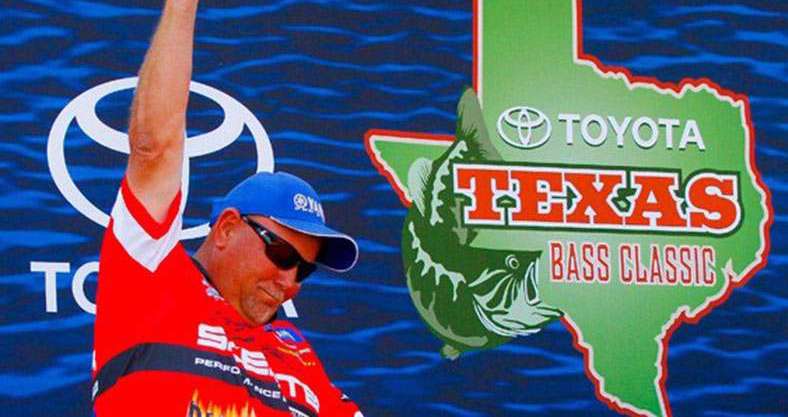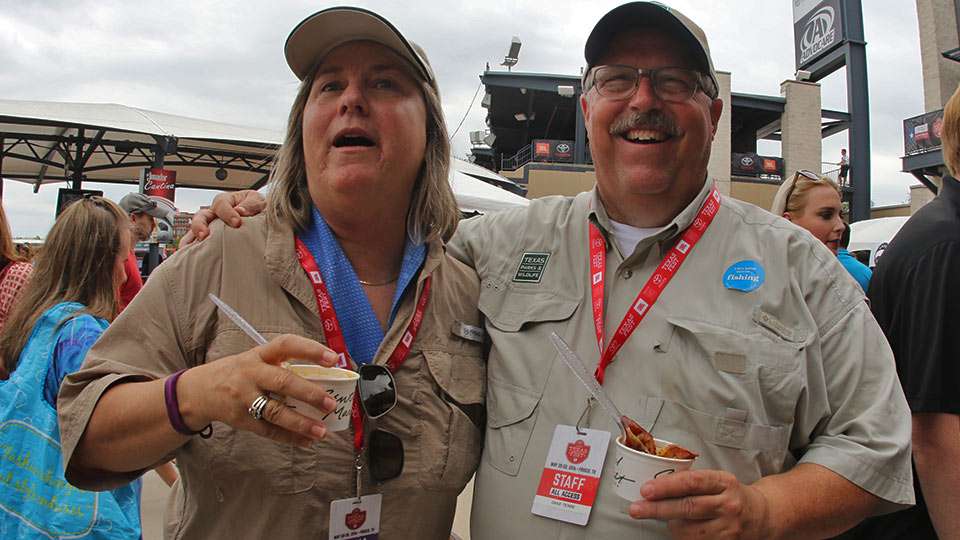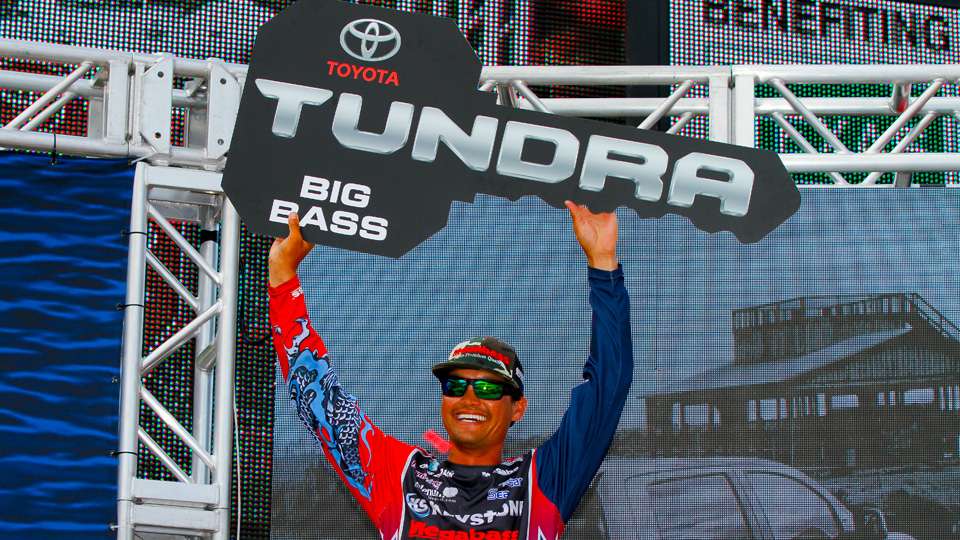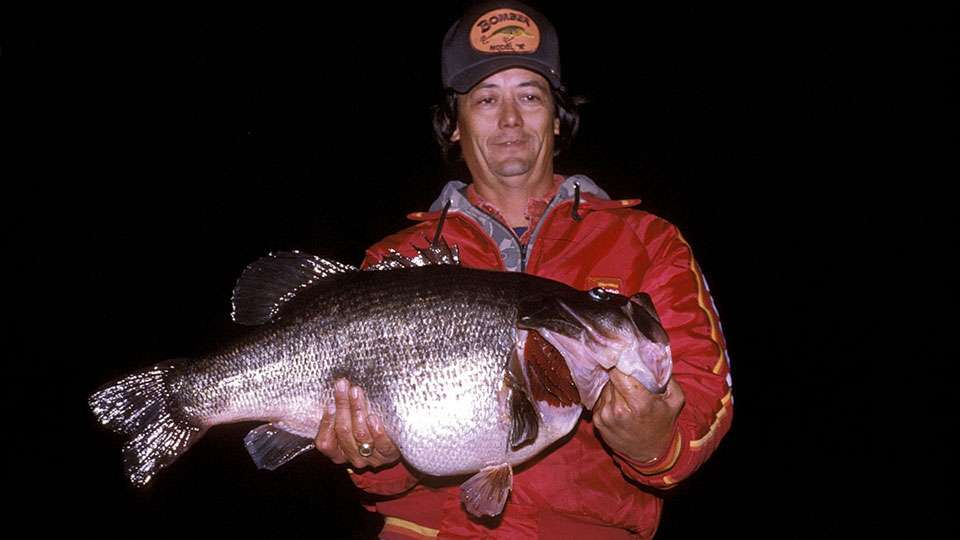
Everything’s bigger in Texas, including fishing. Bass hold a special place in the enormity of the Lone Star State, and they’re even being quantified down to the fin as an economic tool.
It’s long been known that bass and fishing for bass are big business in Texas. Growing big fish and having folks come visit the numerous famed Texas fisheries to try to catch them keeps many local economies in the black. A lot of the businesses and towns around Sam Rayburn Reservoir, site of this week’s Toyota Bassmaster Texas Fest benefitting the Texas Parks and Wildlife Department, thrive from such events.
“Tournament fishing is just big business down there,” said Dave Terre, TPWD’s chief of inland fisheries management/research. “Fishing is a very important economic engine for local communities like Lufkin, Jasper … there’s no question, fishing is important.
“A lot of people come to those reservoirs to spend time fishing. They spend on gas, hotels, etc., and a big component is tournaments. So we manage the reservoir accordingly. Knowing how dollars are spent is important for us to understand.”
Sam Rayburn Reservoir is just one of many trophy bass destinations in Texas, and the TPWD has long quantified what having a nationally recognized fishery means to those living around it. The bass population on Sam Rayburn has consistently provided productive fishing despite heavy pressure. The TPWD reports there are more than 400 bass fishing tournaments and 300,000 angling hours there per year.
In a study conducted by Todd Driscoll and Randy Myers of the TPWD in 2008, the overall value of the Sam Rayburn fishery was figured at $46.7 million. Tournament fishing accounted for 40-60 percent of the annual bass fishing effort and 66 percent of the annual economic value of $31.1 million.
Digging into their paper, published in the Journal of the Southeastern Association of Fish and Wildlife Agencies, shows details of angler spending, including entry fees, boat and vehicle operation, lodging, meals, groceries, tackle and licenses, among other expenditures. What it all means is that fishing is a driving force to be greatly considered.
“Understanding the economic value of tournament angling allows fisheries managers to weigh economic consequences of management actions that could be detrimental to tournament angling (restrictive harvest regulations and tournament permitting),” the paper stated. “Furthermore, economic information for tournaments can be important to local municipalities for justifying local infrastructure improvement and tournament recruitment costs.”
So yeah, build that ramp, huge parking lot and fancy weigh-in facilities, which a lot of lakes in Texas have. If you build it — and have fish — they will come.
Terre said that it is important to quantify bass fishing’s economic impact, and having those figures can assist the TPWD if anything were to pose a threat to diminish the fishery. The fish are even considered when the U.S. Army Corps of Engineers thinks about managing lake levels. With a $46.7 million fishery at stake, the TPWD will be consulted most times before any action is taken that could affect fishing.
Terre said it isn’t the be-all, end-all of any discussions, but “it certainly gives us a seat at the table.”

TWO BIG EVENTS MERGED IN BASSFEST, TTBC
Terre wasn’t surprised when, after 10 years of Toyota Texas Bass Classics, the series would partner with B.A.S.S.
“I knew there had been some talks, but no one was certain that BASSFest and TTBC would be merged,” Terre said. “We’re exciting about the new relationship. It gives us some new opportunities, and we hope to have great event.”
The TPWD has worked closely B.A.S.S. in the past, especially when Sam Rayburn became the first major reservoir in the state affected by Largemouth Bass Virus (LMBV). Thousands of large bass died during that 1998 breakout, leading to the collaboration.
“We worked with B.A.S.S. conservation to try to dispel rumors and uncover facts about the virus, because everyone was panicking — how it’s caused, what it does and how it impacted the bass population,” Terre said. “The population is fully recovered. It bounced back to its full glory in a short period of time.”
That experience led the TPW to begin including tournament catch data into its fishery monitoring.
TOYOTA AS SPONSOR MEANS PAYDAYS
The TTBC was a large bass event, bringing together the top 15 Elite and FLW anglers along with several who received exemptions. It paid $100,000 for first place along with a boat, while the Big Bass Award rewarded the angler with a Toyota Tundra.
Texas Fest is on par if not ahead, offering the winner the same purse plus a berth into the 2018 GEICO Bassmaster Classic presented by DICK’S Sporting Goods. The largest bass again will win a $50,000 truck, but it’s the rest of the field that will not be feeling left out.
In most Elite events, anglers who don’t finish 51st (the two-day cut) or better go home empty-handed. The $1 million purse in Texas Fest pays out all the way to last place, so even if you’re stiffed on the water, you won’t be at the bank.
Second place and fourth place have $9,000 bumps from a regular Elite to $34,000 and $24,000, respectively, and third place is increased $10,000 to $30,000. All the top 12 will earn a bit more, and 13th to 51st get another $1,000 from the usual payday.
There should be few hurt feelings this week as those finishing 52nd to 60th take home $5,000 (way better than nothing) and 61th-70th earn $4,500 while the rest, all the way to 109th, get $3,500.
So, the anglers will probably all leave, succeed or fail, shouting “Yeah, Texas Fest.”

SHARELUNKER PROGRAM REACHES 31
The Toyota ShareLunker program, which began as a way to promote catch-and-release of big bass as well as to breed and study true lunkers, is in its 31st year of existence. It has seen 570 bass over 13 pounds donated.
Starting as Operation Share a Lone Star Lunker in 1986, it merged with the Parks and Wildlife Foundation of Texas in 1993, and the program name was changed to Share a Lunker, Inc. Anheuser Busch provided prizes to entrants as it sponsored the Budweiser ShareLunker Program from 1996-2008.
Toyota has sponsored ShareLunker since, and this year has seen the first spawn of a previous entrant make the list. On Feb. 10, Ryder Wicker caught a 13.07-pounder from Marine Creek Lake, and the program’s 566th fish was determined by genetic analysis to be the daughter of ShareLunker 410, a 14.48-pounder caught from Lake Conroe in 2006.
The next ShareLunker, landed two weeks later, was also an offspring. It was also the first from Lake Naconiche, impounded only eight years ago. Three more fish this year were notable ShareLunker entries, which made the season memorable. Program coordinator Kyle Brookshear said to expect a bigger season next year as expansion is in the works.
“Starting next season we will be implementing several exciting changes that will better engage the public in the promotion and enhancement of bass fishing in Texas public waters,” he said. “We will be unveiling those plans later this year, and we think anglers are going to be very excited about what we are planning to do. Ultimately our goal is to help more anglers catch lunker bass in Texas.”
Anglers who entered fish this year will be recognized during a banquet at the Texas Freshwater Fisheries Center in Athens, where the breeding and genetic studies are conducted, on June 3. Gulf States Toyota is the major sponsor of the TPWD program.

ETHEL: TEXAS’ MOST POPULAR BASS
The first fish entered as a ShareLunker might be Texas’ most famous, writes Matt Williams of Fishgame.com.
Mark Stevenson caught the 17.67-pounder from Lake Fork in November, 1986, and while the “fat bass nicknamed ‘Ethel’ no longer ranks as the state record, most Texas big bass historians will agree that this is arguably the most famous fish in Texas freshwater fishing history.”
Why? Well, as a state record and inaugural ShareLunker entry, it drew national attention. So much that Bass Pro Shops owner Johnny Morris acquired her to live in a huge aquarium at the BPS in Springfield, Mo.
The monster was a hit with visitors, and when she died at 19 years old in 1994, Morris gave her a memorial service that was reportedly attended by 1,000 people.
The fish lived on, Williams writes, as in 2004 Morris provided a “$650,000 challenge grant to aid in the construction of the $2 million classroom/conservation center at the Texas Freshwater Fisheries Center in Athens.” That’s the new ShareLunker facility where the big fish are sent to be bred and studied, and Morris dedicated his contribution in Ethel’s name.
TOYOTA TEXAS BASS CLASSIC RESULTS
| YEAR | LAKE | WINNER | WT | BIG BASS |
|---|---|---|---|---|
| 2007 | Fork | Terry Scroggins team | 244-12 | John Sappington 11-2 |
| 2008 | Fork | Kelly Jordon team | 228-0 | Bobby Lane 11-12 |
| 2009 | Conroe | Dave Lefebre | 46-12 | Sean Hoernke 9-8 |
| 2010 | Conroe | Brian Snowden | 48-4 | Mike Iaconelli 9-8 |
| 2011 | Conroe | Keith Combs | 76-12 | Keith Combs 10-8 |
| 2012 | Conroe | Bryan Thrift | 53-4 | Terry Scroggins 7-7 |
| 2013 | Conroe | Keith Combs | 62-8 | Jason Christie 9-0 |
| 2014 | Fork | Keith Combs | 110-0 | Keith Combs 10-14 |
| 2015 | Fork | Brent Ehrler | 89-12 | Brent Ehrler 10-11 |
| 2016 | Ray Roberts | Matt Herren | 51-12 | Chris Zaldain 7-12 |

